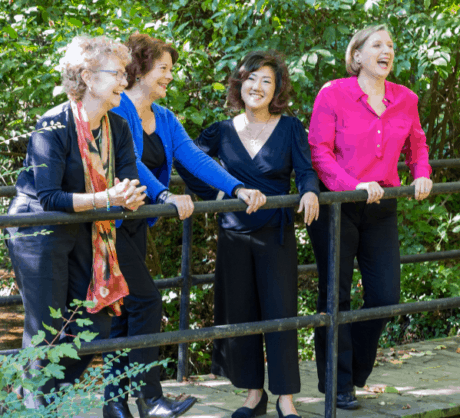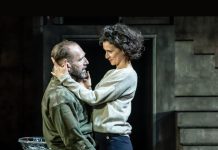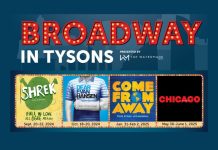This is the second installment of In the Moment columns focusing on the Pipeline Playwrights. Pipeline Playwrights is a small collective of accomplished Northern Virginia women playwrights. Pipeline’s current playwrights include Patricia Connelly, Jean Koppen, Soo-Jin Lee and Ann Timmons.
A key goal of Pipeline is to build “a pipeline to production.”
The first Pipeline Playwrights article focused on Soo-Jim Lee and Anne Timmons.
This second installment focuses on Patricia Connelly and the upcoming reading of her Around the Snake Turn and also on Jean Koppen who will have a reading of her Unprotected. Both readings will be on Monday evenings: April 3 for Connelly’s Around the Snake Turn and May 8 for Koppen’s Unprotected. The readings will feature local area actors. Experience the readings at Alexandria’s MetroStage
There is abundant free parking available and nearby foodie venues.

David Siegel: Patricia Connelly, let’s start with you. Why did you want to become a playwright?
Patricia Connelly: I have been writing plays for over twenty-five years. I suppose what you are asking is why a playwright and not a novelist or poet. I started writing when I was young and took a playwriting class on a lark. After I’d been working in Washington a few years, I wanted to learn more about writing and meet other writers in the area. I saw a notice for a playwriting class at a local theater near my house and decided to sign up. I didn’t know much about the theater and had no particular desire to write a play, but I had a great, inspired teacher (John Glavin, a Professor at Georgetown University).
I fell in love with the theater and the notion that, with plays, one’s words come alive on stage. After that class, I never looked back. I began to learn everything I could about theater. I studied directing and acting and worked as a director, stage manager, costume designer, and producer — all to, hopefully, make me a better playwright.
Please tell me a bit about Around the Snake Turn.
In Around the Snake Turn, a family in a West African tribal village has barely finished celebrating their son’s good fortune at being awarded a scholarship when he is accused of a crime. Although his mother, Baaba, knows her son could not have committed the crime, she cannot prevent the local priest from placing a curse on the extended family in accordance with the centuries-old practice known as trokosi.
The deeply held belief is that the curse will bring disease and death to the extended family of an accused, unless the family atones by offering a young virgin girl to serve as a “wife to the gods.” In reality, the young girl becomes a sex slave to the priest, serving for five or more years, sometimes for life. Once Baaba realizes her 10-year-old daughter, Aku, is at risk to be offered to serve, she pits herself against husband, family, culture and tradition to save her children from the fates that could destroy all of their lives.
What was the impetus to write Around the Snake Turn?
Some time ago, I read an article in the New York Times about a 12-year-old girl who was given to a priest as a trokosi to atone for a crime committed by a relative. The story haunted me. Two years ago, I started doing research and began writing the play.
Who will be reading your Around the Snake Turn at MetroStage?
The reading will be directed by Ms. Cody Jones and will feature: Gayle Carney, Aakhu Freeman, Obi Nwachukwu, Caroline G. Pleasant, William Shipman, and Kanysha Williams.
What do you hope to obtain/gain from the reading of Around the Snake Turn before a live audience?
With every reading before a live audience, I want to hear and feel the audience’s response to the play as it is in that moment. I want to know if the play engages the audience. I also want feedback from the audience as what they heard, how they feel and whether there are moments in the play that are not clear.
What would you like the audience to come away with after the reading?
I would like audiences to be drawn into this family’s story, and ultimately to be moved by the characters. I also want audience members to come away with an understanding of what this culture and religion demands of its people, particularly the women and girls. I am interested in exploring the intersection of religion and human rights, and more specifically the rights and lives of women and girls.
Is there is anything additional you would like provide, please feel free to provide.
I wrote and developed the first draft of the play while I was an MFA student at Goddard College. The first reading of the full play was in September at the Kennedy Center’s Page-to-Stage festival.

David Siegel: Jean Koppen, I would like to talk to you now about your play Unprotected. Why did you want to become a playwright?
Jean Koppen: I love the experience of theater. As a playwright, I want to create a story that the audience connects with and is shaped by the experiences they bring. I’m interested in writing characters and situations that are open for interpretation and spark conversation and debate long after the curtain comes down.
Please tell me a bit about Unprotected?
Sarah learns from her teenage daughter Grace that some boys called Grace a slut at school. Both are upset by the event, compounded by the fact that Grace’s cousin Zach was among the boys harassing Grace. Sarah shares the incident with her husband Ed, who wants to confront Zach’s parents (Sarah’s brother Doug and wife Regina) arriving for a birthday celebration. Sarah delays the confrontation, but eventually they share what Grace has told them and the couples argue over what happened. Eventually, they bring the kids together and find out the harassment was more serious and disturbing, bringing up painful memories and unresolved conflict between Doug and Sarah. In the aftermath, Sarah makes a strong choice for her and her daughter, hoping to gain the strength needed to survive a world in which she feels unprotected.
What was the impetus to write Unprotected?
During the recent election, the president made comments about women that treated sexual assault lightheartedly. Some people were upset, others didn’t care, but the remarks and the ensuing media coverage had severe consequences for some survivors of sexual assault. I read numerous accounts online from women for whom the comments opened up deep wounds and made them feel unsafe. I wanted to write a play that showed how words and our reactions to them have consequences based on one’s past experience. I expect that viewers will interpret the situations portrayed in Unprotected differently, and my hope is that they may have conversations, discussions, disagreements and perhaps understanding as a result.
What do you hope to obtain/gain from the reading of Unprotected before a live audience?
Readings with actors in front of an audience are critical to the play development process. As a playwright I want to hear and see what’s working. Did the audience laugh? Gasp? Check their watches? Lean forward? Squirm? I also plan to have a talk back after the reading and hear from the audience what they thought, whether they identified with the characters and situation, and find out whether the play resonated with them. I can’t wait to find out!
What would you like audience members to come away with after the reading?
I’d like audience members to have a deeper understanding about how a joke or a comment said in jest may be incredibly painful to someone else. In particular, I hope men and women may think about the other gender’s worldview, and feel increased compassion for what others go through.
Pipeline Playwrights’ new play readings will take place on April 3, 2017 and May 8, 2017, at MetroStage – 1201 North Royal Street, in Alexandria, VA. For information go online.
LINK:
In the Moment: A Talk with the Pipeline Players: Part One: Ann Timmons and Soo-Jin Lee.




